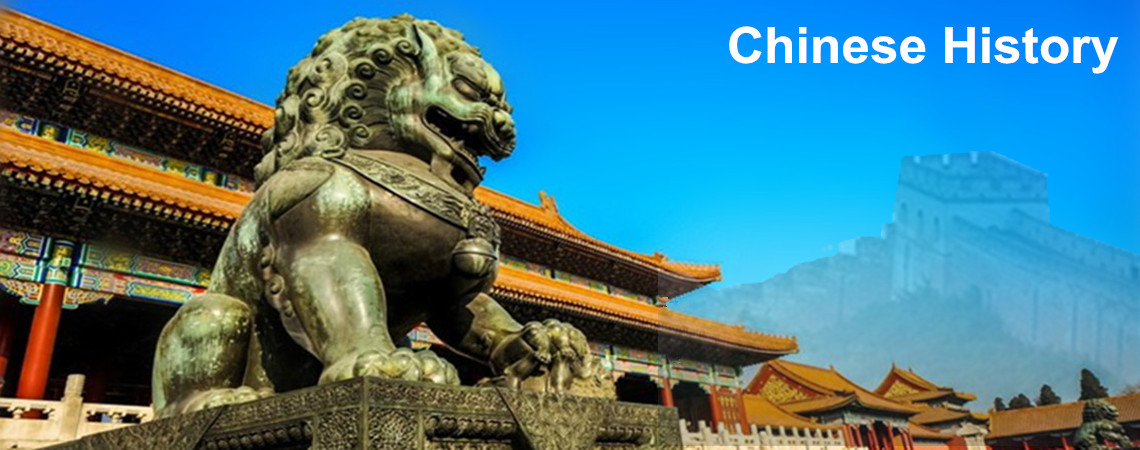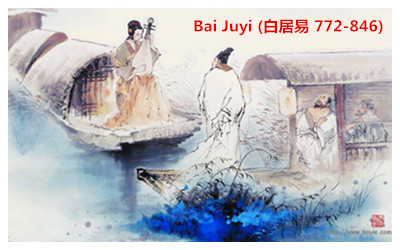
Bai Juyi 白居易, famous poet in Tang Dynasty
 Bai Juyi (白居易 772-846) , born in Xinzheng of Henan Province, was another outstanding realist poet after Du Fu in the Tang Dynasty (618-907). He was the most prolific poet among Tang Dynasty poets. His poemswere divided by himself into four categories: satire, leisure, sentimentand miscellany His most important legacy to Tang poetry were theattributes of his satirical poems.
Bai Juyi (白居易 772-846) , born in Xinzheng of Henan Province, was another outstanding realist poet after Du Fu in the Tang Dynasty (618-907). He was the most prolific poet among Tang Dynasty poets. His poemswere divided by himself into four categories: satire, leisure, sentimentand miscellany His most important legacy to Tang poetry were theattributes of his satirical poems.
Bai Juyi's satirical poems have two themes: poems reflecting on thebitter life of common people, as in The Old Man in Duling ,which showssympathy for the peasant; The Lady of Shangyang Palace and The Songsof the imperial Harem, which bemoans women's fate; and poemsunmasking the evils of the ruling class, such as The Old Charcoal Sellerand Red Carpet.
The Song of Everlasting Woe is a classic of Bai juyi's poems, andalso one of the most famous narrative poems in all of Chinese literature.The first part of the poem criticizes the emperor for seeking pleasure atthe cost of the interests of the country, and the latter part turns todescribing with praise the emperor's deep love and remembrance ofLady Yang, his beloved concubine. But the poet's sympathy and praiseof the emperor's faithful love still have an edge of criticism, whichendowed the subject of this poem with double meaning. The latter partof the poem adopts a romantic way of expression, which greatly enhancesthe poem's expressive potential. The vividly portrayed charactersbeautiful language and rhymes, as well as the well-blended narrationand landscape depiction, were also important artistic achievements inThe Song of Everlasting Woe.
Song of Pipa the Tartar Lute is well known in the Chinese literaryworld, and more realist than The Song of Everlasting Woe. The poet, onone hand, expressed his great sympathy toward the woman lute player,while on the other hand, voiced indignation at his own banishment. "Bothof us were sad drifters in this lonesome place / Here we meet - whyneed we be acquainted from former days?" have become well-knownlines. This poem is skillfully arranged with lifelike and exquisitedescriptions. The metaphor describing the pipa's music has consistentlycharmed generations of scholars.
The convergence of motif and Subject matter is one artistic techniquein BaiJuyi's satirical poems. Generally, he only described one issue andgave prominence to one definite motif in each poem. The second artistictechnique of Bai's poetry is evident in his characterization. He was goodat capturing a character's main features and illustrating them in simplelanguage. For example, in portraying the old charcoal seller, he usedonly one sentence, "his face is gray and dusty, and his hair white andhands blackened" to delineate a distinct image. Most of BaiJuyi's satiricalpoems are narrative poems, often involving commentary. This seamlessmelding of narration and comment is another distinct attribute of Bajuyi's satirical poems.
The language in Bai's poems is simple and fluent.He adopted few literary quotations and obscure words and sentences inhis poems, but the ease of language does not necessarily imply that theconception of the poem was shallow. In fact, Bai often deployed satiricalmeaning in simple words and achieved astonishing artistic effect. In FineHorse and Fur ,he expends lavish ink describing the imposing air of highofficials participating in a feast and the luxury of the food, but theconcluding sentence goes thus: "Serious drought hit South China thisyear / People in Quzhou could eat nothing but human beings"-fore-grounding a tragic and barbarous episode by presenting a sharpcontrast.







 Ask Questions ?
Ask Questions ?